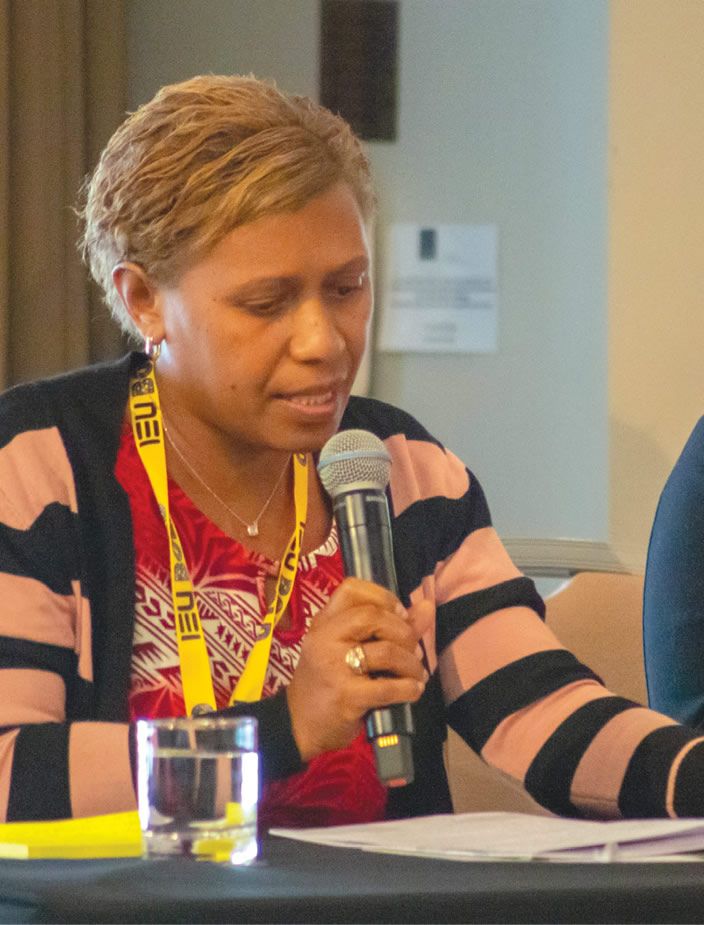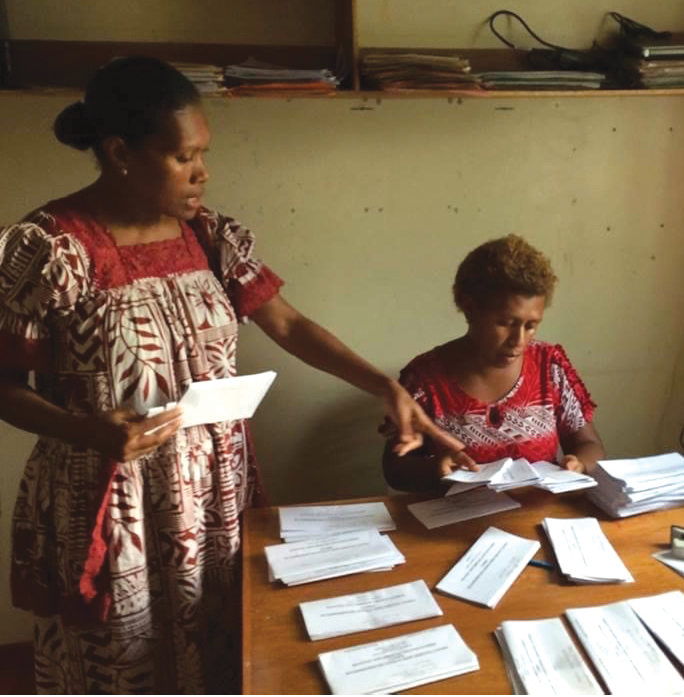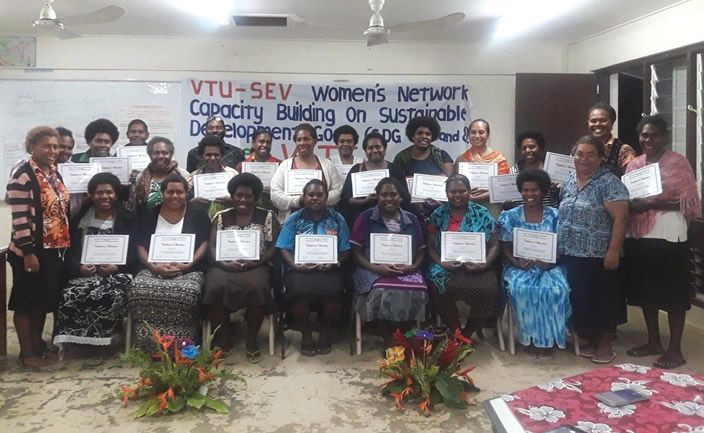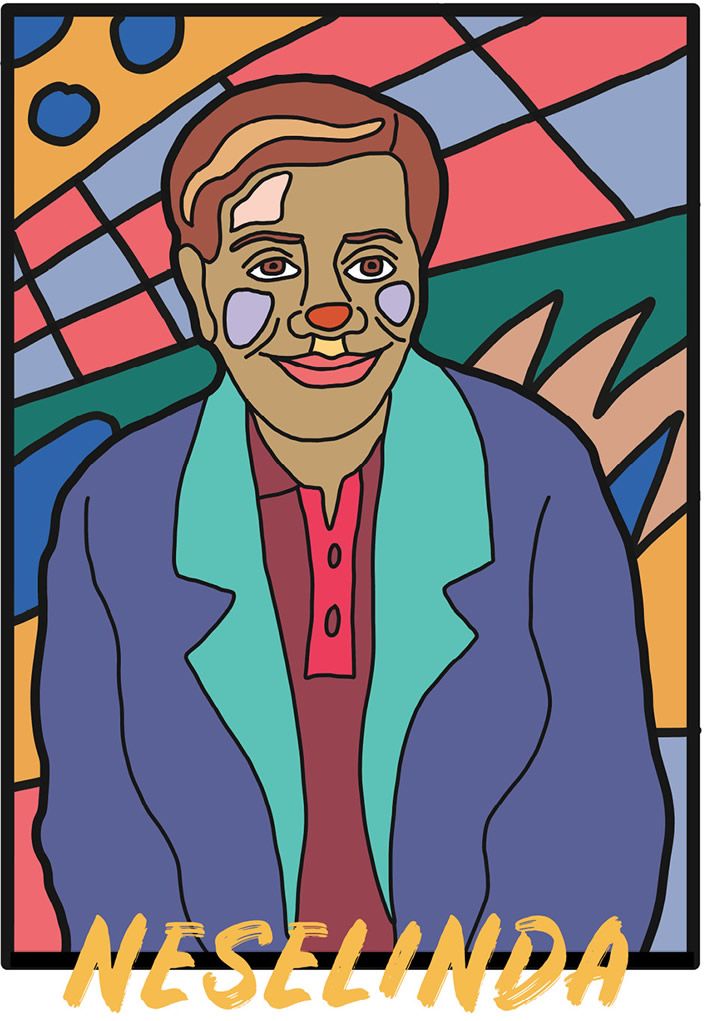inFOCUS: Neselinda Meta

Recently elected as the President of the Council of Pacific Education (COPE), Neselinda Meta has been a Building Our Leadership Development (BOLD) union woman and passionate teacher for the past two decades, writes IE journalist Jessica Willis.
Neselinda is a classroom teacher and deputy principal of a newly established primary school, of around 100 students, in Vanuatu.
“I became a teacher because of my family background,” said Neselinda.
“My parents were both teachers and as the eldest child I was responsible for looking after my seven siblings.
“I also grew up in a village where I liked working with children, for example, as a Sunday School teacher and doing activities such as camping out with children.
Neselinda remembers her first years of teaching as tough but foundational, as she honed her professional judgement and learnt how to work with her colleagues.
“The first years of teaching were challenging as I was young and I questioned my decision making,” she said.
“However, it was good experience and I learned a lot.
“I am now experienced in the field with a lot of confidence within myself to do my job well and to serve to the best of my ability for my students.
“I believe that teaching is a calling that gives great purpose to one’s life and it is never the same one day to the next.”
Neselinda said one of the basic human needs is belonging and, as a teacher, you experience a sense of belonging because you have a place to go every day where you are needed and you pass on that feeling to your students.
“It’s about building people and helping them become more of what they are meant to be,” she said.
“The relationships you develop as a teacher are absolutely amazing. You are meeting people at a critical point in their life and having a good chance to be part of their lives,” she said.
Of course, no matter where you are in the Pacific (or the world), the challenges of the teaching profession seem to be universal.
Neselinda believes the hardest part about teaching is making sure you establish good connections with your students, meeting and managing the demands and expectations of parents, and ensuring you are always a strong role model for your students.
Unionism in the Pacific
Neselinda joined her union, the Vanuatu Teachers’ Union (VTU), as soon as she graduated from teachers’ college and has remained a strong union activist since, focusing particularly on organising and facilitating women’s networks throughout Vanuatu and the Asia Pacific region.
“I first joined [my] union when I graduated from teachers’ college.
“The message around that time was that the union was a body who fought for teachers’ welfare which is why I decided to sign up,” she said.
Being an active union member is important to Neselinda, as members are what ultimately give the collective strength in numbers, contribute to the broader education of workplace health and safety rights, further the quality of the teaching profession and provide more opportunity for training and professional development.
As part of the VTU, Neselinda has worked hard to help negotiate wage increases for teachers in Vanuatu, implement collective bargaining with the Teaching Service and Ministry of Education (of Vanuatu) and provide training to members.
Natural disaster and crisis aid
Another significant function of the VTU is to give advice and support to members during times of national crisis and natural disaster, to ensure the health and safety of educators, students and their communities.
Confronted by three major crises in 2020 so far (COVID-19, tropical cyclone Harold and a volcanic eruption) there has not only been significant disruption to education but extensive damage to homes, shelters and food and water sources.
Neselinda said the VTU was helping bring relief to members during and after these national crises through: distributing food, health and sanitary items including mosquito repellents and paracetamol drugs; and ensuring members on different islands are reached by hiring boats to distribute aid items and check on them.
Capacity building for women in the Pacific
Elected as Secretary of the VTU Women’s Network in 2009, Neselinda held this position for 10 years.
In 2015, Neselinda was awarded the COPE Alisi Fusi Wightman Scholarship for her work in ensuring that the women within the VTU, particularly those in outer regions, receive capacity building skills and rights knowledge through a dedicated schedule of training. Some of the activities Neselinda helped organise over this time included:
- a 2014 workshop to broaden and strengthen unionism among women in the VTU women’s network and launch the Unite for the Quality of Education for All campaign
- a 2017 workshop on implementing the United Nations' Sustainable Development Goals though developing workplans
- a 2018 food preservation workshop to further educate women on food preparation (a lack of fresh food became a reality for members after the devastation of tropical cyclone Pam in 2015)
- professional development in 2018 on gendered violence; domestic violence is a big issue in Vanuatu and teachers are encouraged to address the issue from early schooling
- professional development in 2019 on gender equity and education
- ‘train the trainer’ sessions with union partners on working rights
- projects and workshops to improve life skills such as sewing and financial literacy, encourage women’s participation in leadership decision making and meetings and strengthening network building
- working with stakeholders on promoting climate change awareness and solutions.
These are significant achievements as the geography of Vanuatu makes it challenging logistically and financially for members to come together. It is through such activities, largely driven by Neselinda’s leadership, that the VTU Women’s Network has been empowered to campaign for change.
Education International and the Council of Pacific Education Unions
COPE is a registered organisation of education unions from the South Pacific and is a sub-branch of Education International’s (EI) Asian and Pacific Region Divisions.
It comprises education unions from Australia (IEU, AEU and National Tertiary Education Union), the Cook Islands, Fiji, Kiribati, New Zealand, Papua New Guinea, Samoa, the Solomon Islands, Tonga, Tuvalu, Vanuatu and Wallis and Futuna.
COPE hosts biennial conferences to address issues facing education in the South Pacific. In 2016, Neselinda was elected to the position of Women’s Network Coordinator in COPE and, unsurprisingly, took an active role in supporting the women's networks in other COPE affiliates across the Pacific.
Then, in 2017 she was elected to EI Asia Pacific Regional Committee and last year became President of the council.
“I’ve worked with COPE over the last three years as a Women’s Coordinator and now as the recently elected COPE President,” Neselinda said.
These leadership positions, she said, have shaped her to be transparent in decision making and trustworthy to her colleagues.
The experience has also taught her the true value of unions and how critical they are to ensuring members’ overall welfare.
“It was a great opportunity taking up these leadership positions because I have gained a lot of experience and have learned a lot from these different roles.
“I believe I am where I am today because of the passion I have for my union and being a union member.
“I’ve developed both courage and boldness to be strong and stand as a leader in the Pacific Union.”
BOLD Woman
Not only has Neselinda worked tirelessly with women’s networks in Vanuatu and the Pacific region but with the IEU’s women’s network – BOLD (Building Our Leadership Development).
Last year, Neselinda was a special guest panellist at the IEU BOLD Women’s Conference (pictured opposite page), discussing strategies to encourage women into union work despite the pressures of traditional and cultural barriers.
Neselinda said that key cultural challenges for women in leadership include fighting gender stereotypes, juggling professional roles with parental and family/caring roles, being too cautious to take risks and questioning their own judgement.
“Supporting women’s leadership in unions and within the workplace, I believe, is a key to reduce poverty, promote economic growth and democracy as well as increase the wellbeing of women, girls and their families.
She had strong values and encouraged women in their union and teaching profession.
She was a pioneer unionist who developed the foundation of COPE.
The scholarship program is awarded to two female union activists in COPE and focuses on developing their union and professional skills to increase recipients’ knowledge and confidence.
The recipients spend one week in Australia meeting representatives of the Australian Education Union (AEU) and the IEUA, then a further week in New Zealand with the Post Primary Teachers’ Association (PPTA) and New Zealand Educational Institute (NZEI) Te Riu Roa.

“Despite these barriers, we women in our unions have to be strong and united and share ideas to build each other up, regardless of our different nationalities and cultures.

“We are the backbone of the working world. We must always think about how to start small and build our way up from there.”
She believes that within the next 10 years, Pacific education trade unions will be different as more women are willing and able to step up into leadership positions.
They are starting to be seen as important drivers in the unions of the Pacific.
“Women in leadership within unions and COPE are a big challenge because of our culture.
“As time passes women have begun to build themselves to become leaders through training and empowerment provided by COPE and other non-government organisations that work collectively with unions.

“It is a reality that cultural restraints can deny Pacific women their voice and undermine their confidence to stand up in public and fight for justice,” she said.
“But women are always concerned about the real facts of an issue and readily educate themselves to see things from different angles.
“Therefore, women are ready to target issues immediately once they gain a leadership position, that is why we need more women in leadership.
“It will make the difference that is needed,” Neselinda said.
Neselinda’s advice on taking up a leadership role:
- Lead by example: leaders need to show not just tell.
- A little humanity goes a long way – there is a difference between a leader and a boss.
- Effective communication is important.
- Know your limits.
- Find a mentor.
The IEU’s BOLD Women’s Network was launched in 2017 at an inaugural conference which united 100 women from IEU branches across Australia.
Within the BOLD program women members are encouraged to become active in their union by networking with colleague members, attending professional development, connecting online and determining what their leadership development should look like.
To get involved in BOLD, members should contact their union branch.


































































































































